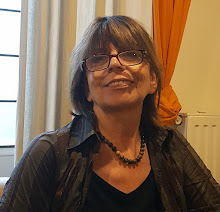‘Just receiving appreciations for
my “poetic* and philosophic” approach to life.
Here you are an interesting quote from "Plato, Not Prozac!” by Lou Marinoff:
The stigma of sickness
is placed on those going through personal problems,
many of which are actually rooted
in philosophical dilemmas
underlying one's basic approach to life
and its problems.
Medications just suppress the symptoms,
without getting to the core issues,
which are often
philosophical.
Therefore I will keep playing philosophical – for the best –
and for the best of my life and my activity
and of the people I coach.
Philosophic approach is an esquisite tool
for the larger frame of reference
i.e. larger area of options – and awarness
regarding the freedom of choice.
This empowering position in life leads to
appropriate action plan.
If you will not see your life in a connectedness
with the whole,
your action plans would be
valuable just to the place where
your world meets the World –
there are many chances to get frustrated
on that edge.
So, start with the 3 M – myself, meaning, mission
Be aware of the 3 O – Oh’s (better known as ”a-ha moments”), offers, options
Get through the 3 P – person, perception, presence.
MOP your self,
then go GROW (the most applied coaching model)
or go GENIUS (another coaching model).
It is a nice novel by Leonard Cohen “The Favourite Game”
I should speak of my way as “The Effective Game”
:)
*poetic?
well, the content of your life is the content of your words -
but what about the feelings you felt, feel, would like to feel?
how can you express them?
and here I am with Wittgenstein -
The limits of my language are the limits of my world. -
only if understanding language as something more then words,
something like this famous saying of Saint Augustin
What, then, is time?
I know well enough what it is, provided that nobody asks me;
but if I am asked what it is and try to explain, I am baffled.
Time is much more a feeling than a content.
The saying of Saint Augustin is more poetry than words.
That is what poetic stands for -
to be complete.
skip to main |
skip to sidebar

Through 'Nestworking' you build an energetic gradient for the change you want to achieve - "Growing is an act of freedom"
Postare recomandata
Coaching, then and now
''Cel mai tare m-a impresionat felul cum dispari ca viata personala in fata celui caruia ii oferi coaching.'' Magda Bunea,...
Despre mine

- coach Magda Bunea
- pot să abstrag de la tors - vorba lu eminescu - si sa vad fuiorul ---------------"when me they fly i am the wings" - ralph waldo emerson
Etichete
- 1 personal coach (20)
- 1 prix blogal (1)
- about me (47)
- about me; me about coaching/english (6)
- argument (3)
- as a professional coach (18)
- as professional trainer (2)
- atelier de coaching comunicare: NESTworking (1)
- atelier de comunicare: NESTworking (142)
- autori de incredere (1)
- ce spun oameni frumosi despre mine (13)
- ce spun teste credibile despre mine (5)
- coaching avant la lettre (51)
- coaching inquiry* (3)
- COACHs CORNER/colţul antrenorului (28)
- comunicare si (direct) marketing (62)
- efemeriNde (copyright Ion Frunzetti) (60)
- feeding awareness (1)
- inner game/ timothy gallwey (26)
- interviuri cu oameni mari (12)
- lateral living (127)
- mine (se citeste main) (6)
- PARLEAZ - de aici poți sa incepi să schimbi ceva (46)
- people on the shelf/oameni de care ma mir (91)
- Quotable Magda Bunea © (75)
- revista COACHING NETWORK (15)
- Revista de Povestiri and Imagination Coaching (36)
- România - mon pe ”i” (după E.M. Cioran ”Mon pays”) (87)
- Sharing knowledge (3)
- welcoming transformation (1)
- writtings in english (67)
- writtings on coaching/good for no matter what (140)
- writtings on no matter what/good for coaching (128)
Arhivă blog
-
►
2009
(29)
- ► septembrie (1)
-
►
2011
(76)
- ► septembrie (16)
-
►
2012
(65)
- ► septembrie (2)
-
►
2013
(224)
- ► septembrie (18)
-
►
2014
(111)
- ► septembrie (9)
-
►
2015
(126)
- ► septembrie (10)
-
►
2016
(60)
- ► septembrie (2)
-
►
2017
(36)
- ► septembrie (4)



